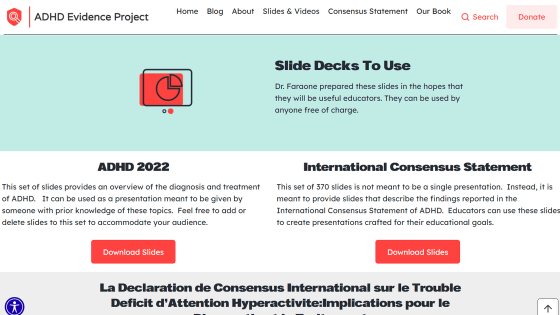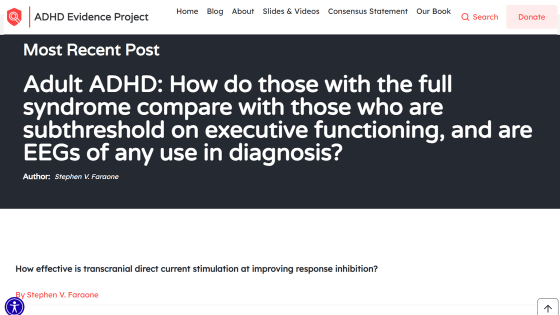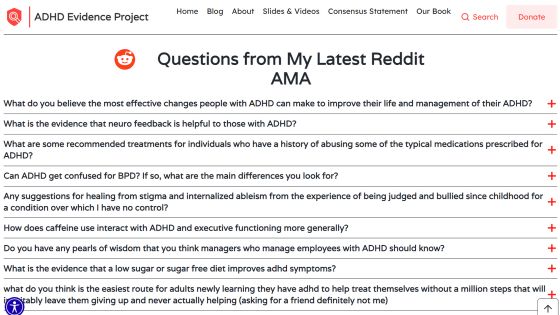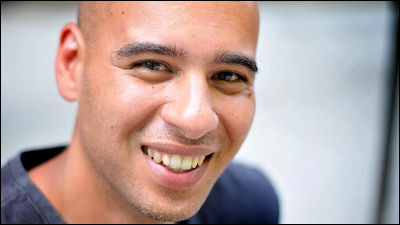'ADHD Evidence Project' to improve the lives of people with ADHD in a scientific evidence-based way

ADHD Evidence Project
https://www.adhdevidence.org/
The ADHD Evidence Project is a website run by Stephen Faraone , an American psychologist and leading authority on ADHD research. We collect and disseminate information based on scientific evidence for people with ADHD, their families, and clinicians, with the ultimate goal of improving the lives of people with ADHD.
If you visit the ' Slides ' page, you will find slides 'ADHD 2022', which outlines the diagnosis and treatment of ADHD, and the 'International Consensus Statement,' which summarizes statements about ADHD endorsed by researchers in 27 countries. )” can be downloaded.

On the '

Also, on the homepage, Q & A about ADHD answered by Mr. Faraone on Reddit of the overseas bulletin board is displayed.

The questions about ADHD displayed on the homepage at the time of article creation and Mr. Faraone's answers are as follows.
Q.
What changes would be most effective for people with ADHD to improve their lives and control over their ADHD?
A.
In addition to taking your prescribed ADHD medications, it is also important to learn the principles of
Q.
Is there evidence that neurofeedback , which uses an electroencephalograph or computer to adjust brain waves, can help improve ADHD?
A.
From randomized controlled trials, it is clear that neurofeedback is not an effective treatment for ADHD. As such, it is not recommended by any guidelines.
Q.
What are the recommended treatments for people with a history of abuse of typical ADHD medications?
A.
Non-stimulants such as atomoxetine , extended- release clonidine , guanfacine , and viloxazine . Cognitive-behavioral therapy is also ideal as an adjunct to medication.

Q.
Can ADHD be confused with Borderline Personality Disorder (BPD) ? If so what is the difference between the two?
A.
Although the two disorders are well-distinguished by an expert, the two may occur together, and one may go undiagnosed.
Q.
Is there a good way to heal the internalized stigma and disability discrimination that comes from being criticized and bullied as a child for symptoms that you can't control?
A.
Stigma and bullying are very serious issues for many people with ADHD. Psychotherapy may help with these treatments. It's important to keep in mind that ADHD is a disorder that affects a person, not that it defines a person. People with ADHD have strengths that they can recognize in themselves even if people around them don't.
Q.
How does caffeine intake interact with ADHD and higher executive function?
A.
Previous studies have shown that caffeine helps improve attention, vigilance, reaction time, etc., but this is not effective for ADHD inattention, and effects on memory, higher executive function, etc. is also not clear.

Q.
Is there anything bosses of employees with ADHD should know?
A.
Seek evidence-based treatment and encourage adherence to it. The books of
Q.
Is it true that a low-sugar diet improves ADHD symptoms?
A.
Surprisingly, data shows that sugar consumption does not worsen ADHD symptoms. Special diets other than avoiding artificial colors have not been shown to improve ADHD symptoms.
Q.
What is the easiest treatment for a newly discovered adult with ADHD?
A.
See a doctor experienced in ADHD medication and follow the prescribed treatment. If that treatment doesn't solve the problem, work with your doctor to add things like cognitive-behavioral therapy.
Q.
Can Certain Foods Make ADHD Worse?
A.
Artificial colors have been shown to be problematic for some people with ADHD. No other foods are known to exacerbate symptoms.

Related Posts:
in Science, Posted by log1h_ik







